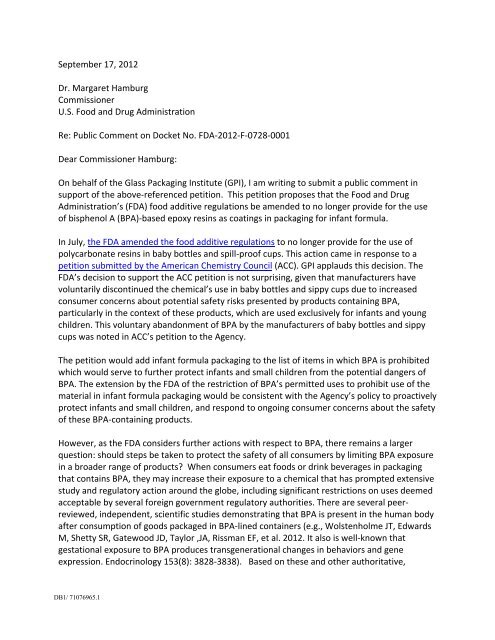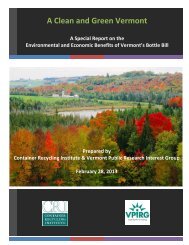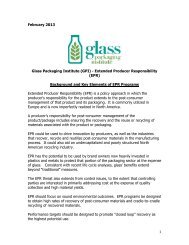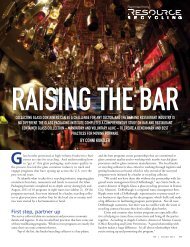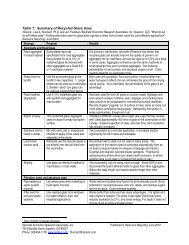GPI Letter to FDA in Response to Petition Related to Bisphenol-A
GPI Letter to FDA in Response to Petition Related to Bisphenol-A
GPI Letter to FDA in Response to Petition Related to Bisphenol-A
You also want an ePaper? Increase the reach of your titles
YUMPU automatically turns print PDFs into web optimized ePapers that Google loves.
September 17, 2012<br />
Dr. Margaret Hamburg<br />
Commissioner<br />
U.S. Food and Drug Adm<strong>in</strong>istration<br />
Re: Public Comment on Docket No. <strong>FDA</strong>-2012-F-0728-0001<br />
Dear Commissioner Hamburg:<br />
On behalf of the Glass Packag<strong>in</strong>g Institute (<strong>GPI</strong>), I am writ<strong>in</strong>g <strong>to</strong> submit a public comment <strong>in</strong><br />
support of the above-referenced petition. This petition proposes that the Food and Drug<br />
Adm<strong>in</strong>istration’s (<strong>FDA</strong>) food additive regulations be amended <strong>to</strong> no longer provide for the use<br />
of bisphenol A (BPA)-based epoxy res<strong>in</strong>s as coat<strong>in</strong>gs <strong>in</strong> packag<strong>in</strong>g for <strong>in</strong>fant formula.<br />
In July, the <strong>FDA</strong> amended the food additive regulations <strong>to</strong> no longer provide for the use of<br />
polycarbonate res<strong>in</strong>s <strong>in</strong> baby bottles and spill-proof cups. This action came <strong>in</strong> response <strong>to</strong> a<br />
petition submitted by the American Chemistry Council (ACC). <strong>GPI</strong> applauds this decision. The<br />
<strong>FDA</strong>’s decision <strong>to</strong> support the ACC petition is not surpris<strong>in</strong>g, given that manufacturers have<br />
voluntarily discont<strong>in</strong>ued the chemical’s use <strong>in</strong> baby bottles and sippy cups due <strong>to</strong> <strong>in</strong>creased<br />
consumer concerns about potential safety risks presented by products conta<strong>in</strong><strong>in</strong>g BPA,<br />
particularly <strong>in</strong> the context of these products, which are used exclusively for <strong>in</strong>fants and young<br />
children. This voluntary abandonment of BPA by the manufacturers of baby bottles and sippy<br />
cups was noted <strong>in</strong> ACC’s petition <strong>to</strong> the Agency.<br />
The petition would add <strong>in</strong>fant formula packag<strong>in</strong>g <strong>to</strong> the list of items <strong>in</strong> which BPA is prohibited<br />
which would serve <strong>to</strong> further protect <strong>in</strong>fants and small children from the potential dangers of<br />
BPA. The extension by the <strong>FDA</strong> of the restriction of BPA’s permitted uses <strong>to</strong> prohibit use of the<br />
material <strong>in</strong> <strong>in</strong>fant formula packag<strong>in</strong>g would be consistent with the Agency’s policy <strong>to</strong> proactively<br />
protect <strong>in</strong>fants and small children, and respond <strong>to</strong> ongo<strong>in</strong>g consumer concerns about the safety<br />
of these BPA-conta<strong>in</strong><strong>in</strong>g products.<br />
However, as the <strong>FDA</strong> considers further actions with respect <strong>to</strong> BPA, there rema<strong>in</strong>s a larger<br />
question: should steps be taken <strong>to</strong> protect the safety of all consumers by limit<strong>in</strong>g BPA exposure<br />
<strong>in</strong> a broader range of products When consumers eat foods or dr<strong>in</strong>k beverages <strong>in</strong> packag<strong>in</strong>g<br />
that conta<strong>in</strong>s BPA, they may <strong>in</strong>crease their exposure <strong>to</strong> a chemical that has prompted extensive<br />
study and regula<strong>to</strong>ry action around the globe, <strong>in</strong>clud<strong>in</strong>g significant restrictions on uses deemed<br />
acceptable by several foreign government regula<strong>to</strong>ry authorities. There are several peerreviewed,<br />
<strong>in</strong>dependent, scientific studies demonstrat<strong>in</strong>g that BPA is present <strong>in</strong> the human body<br />
after consumption of goods packaged <strong>in</strong> BPA-l<strong>in</strong>ed conta<strong>in</strong>ers (e.g., Wolstenholme JT, Edwards<br />
M, Shetty SR, Gatewood JD, Taylor ,JA, Rissman EF, et al. 2012. It also is well-known that<br />
gestational exposure <strong>to</strong> BPA produces transgenerational changes <strong>in</strong> behaviors and gene<br />
expression. Endocr<strong>in</strong>ology 153(8): 3828-3838). Based on these and other authoritative,<br />
DB1/ 71076965.1
publicly available reports and data, <strong>GPI</strong> believes that the relatively narrow scope of prohibitions<br />
on uses of BPA <strong>in</strong> the U.S. reasonably should be expanded <strong>to</strong> protect consumers of all ages.<br />
In a decision earlier this year respond<strong>in</strong>g <strong>to</strong> requests that all food-contact uses of BPA be<br />
prohibited, the <strong>FDA</strong> announced its commitment <strong>to</strong> cont<strong>in</strong>ue its review of emerg<strong>in</strong>g data on<br />
BPA. The agency also announced its commitment <strong>to</strong> perform, moni<strong>to</strong>r, and review new studies<br />
and data concern<strong>in</strong>g the health and safety impacts of BPA, <strong>to</strong> ensure that any new<br />
developments properly <strong>in</strong>forms future regula<strong>to</strong>ry decisions. <strong>GPI</strong> supports the <strong>FDA</strong>’s<br />
commitment <strong>to</strong> study the significant emerg<strong>in</strong>g science around BPA, and would encourage the<br />
agency <strong>to</strong> expand the scope of its review beyond just <strong>in</strong>fants, small children and other<br />
vulnerable populations.<br />
The fact that consumers voted with their feet by gravitat<strong>in</strong>g <strong>to</strong> glass baby bottles is not<br />
surpris<strong>in</strong>g given that glass is the only widely-used packag<strong>in</strong>g designated by <strong>FDA</strong> as “generally<br />
recognized as safe.” As such, it rema<strong>in</strong>s the optimal packag<strong>in</strong>g choice, safely preserv<strong>in</strong>g the<br />
flavor and <strong>in</strong>tegrity of the foods and beverages it conta<strong>in</strong>s while lower<strong>in</strong>g the potential for<br />
exposure <strong>to</strong> <strong>to</strong>xic compounds. For this reason, as concerns about BPA cont<strong>in</strong>ue <strong>to</strong> mount, one<br />
can expect <strong>to</strong> see <strong>in</strong>creased consumer migration <strong>to</strong> glass conta<strong>in</strong>ers.<br />
Aga<strong>in</strong>, I urge the <strong>FDA</strong> <strong>to</strong> both support the petition and expand its actions restrict<strong>in</strong>g BPA beyond<br />
vulnerable populations.<br />
Lynn Bragg<br />
President<br />
Glass Packag<strong>in</strong>g Institute<br />
On behalf of the North American glass conta<strong>in</strong>er manufacturers, the Glass Packag<strong>in</strong>g Institute<br />
promotes glass as the optimal packag<strong>in</strong>g choice, advances environmental and recycl<strong>in</strong>g policies,<br />
advocates <strong>in</strong>dustry standards and educates packag<strong>in</strong>g professionals. <strong>GPI</strong> member companies<br />
manufacture glass conta<strong>in</strong>ers for food, beverage, cosmetic and many other products. <strong>GPI</strong><br />
associate members represent a broad range of suppliers <strong>to</strong> the <strong>in</strong>dustry.<br />
DB1/ 71076965.1


